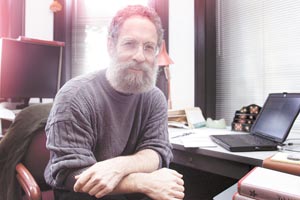Sheldon Pollock, George V. Bobrinskoy Professor in South Asian Languages & Civilizations
By William HarmsNews Office
 |
“The students here are the most inquisitive and professional I have ever encountered. They read widely, and are hungry for more information and have a restlessness that comes from wanting to carve out their own careers in academia,” he said.
The University is one of the worldís leading centers for the study of South Asia, and the study of Sanskrit has traditionally been an important part of that emphasis. Pollock has 12 students finishing Ph.D. degrees and he works closely with each of them as well as students from throughout the University enrolled in his Sanskrit classes.
“I insist on two things for my Ph.D. students: that they have a field experience in South Asia and that they have command of a modern South Asian language,” he said. “Our students have had remarkable success in securing important national fellowships to facilitate travel to South Asia and have accordingly had a chance to work with some of the leading Sanskrit scholars there and experience the culture and traditions of the region.”
In classes and seminars, Pollock exposes students to a broad range of Sanskrit texts as well as provides students with an understanding of how the texts should be understood historically. “I think just being able to read the text is not enough. Students should learn to think critically and realize how texts function in the society in which they were written. They must be understood as part of larger social and political processes,” he said.
Pollock helps students gain a historical perspective in seminars such as his recent “What is Pre-Modernity?” Here he and his students examined the ways people thought about primary problems such as issues as space, time, self and community in early South Asia.“Theories of modernity presuppose an understanding of premodernity that we really do not possess. In modern society, time, for example, is highly rationalized and regulated by a strict calendar and clock. We tried to grasp how different we are.
“Likewise, when it comes to space, our sense of territory is very tightly regulated by maps. Maps did not exist in South Asia before Islamic contact, but people had clear ideas of space that we can reconstruct from texts,” he said.
The seminar is meant to help students understand more deeply the differences and continuities between people in ancient times and our own era, he said.
![[Chronicle]](/images/small-header.gif)